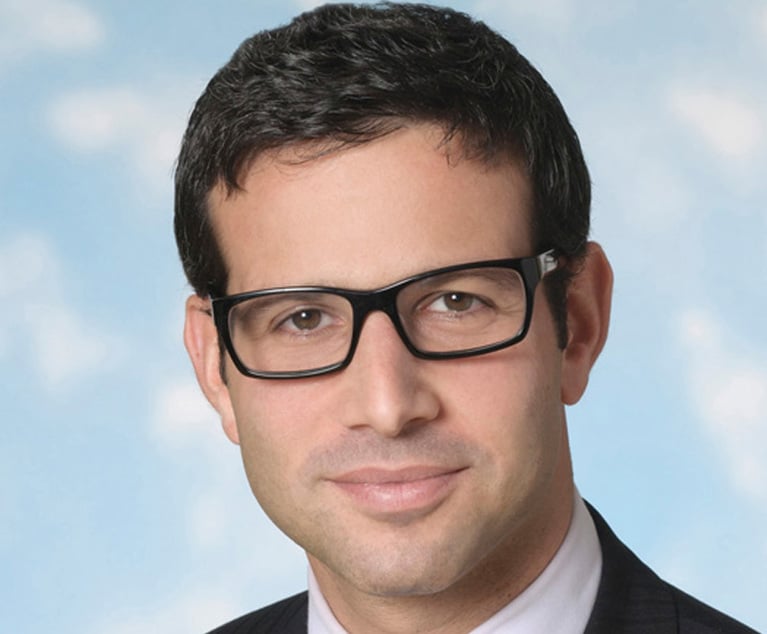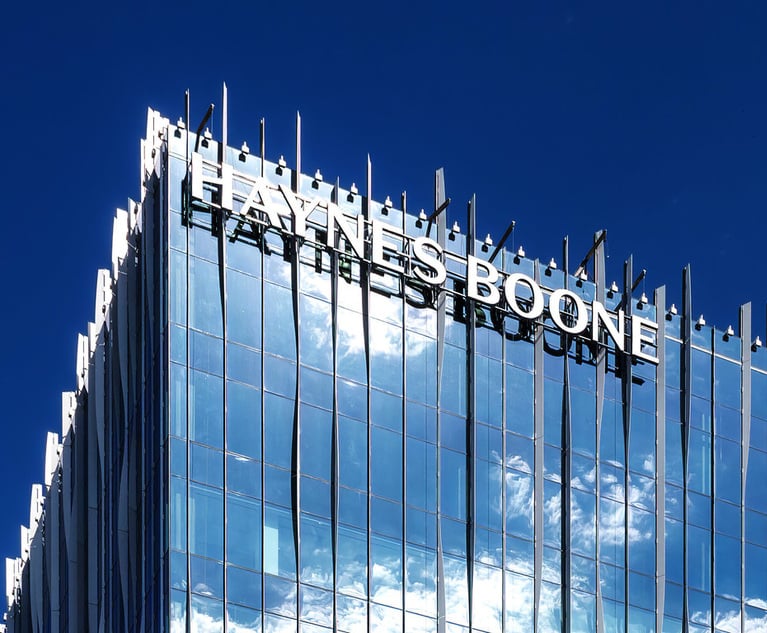 Michael Hurst.
Michael Hurst.Best Mentors: Michael K. Hurst
Michael K. Hurst, partner in Lynn Pinker Cox & Hurst, has been named as one of Texas Lawyer's 2018 Best Mentors.
August 31, 2018 at 06:00 AM
3 minute read
Michael K. Hurst, partner, Lynn Pinker Cox & Hurst
Michael K. Hurst is an experienced trial lawyer with a focus on complex commercial, intellectual property, and employment litigation. Hurst is also the current President of the Dallas Bar Association. Hurst is Board Certified in Civil Trial Law by the Texas Board of Legal Specialization.
Who was one of your most important mentors, and what the relationship like?
I was proactive in being mentored—not so much by someone sitting down and talking to me—but more by tagging along and watching. I was mentored in trying lawsuits and business development by Don Godwin. He was tough on me, but he made sure I was quick on my feet and did not panic under pressure. He constantly reinforced work ethic and the importance of being visible, being punctual and always dressing like a professional. I picked up his mentoring by watching him in court, on business trips, at client and business development meals, and in partner meetings. His way of teaching was not to coddle, but to watch, learn, and hang on to the saddle.
But my broader mentoring, including leadership in the bar and community, came from having lunch or drinks with, presenting and listening to Jim Coleman and others, including Harriet Miers, Barry Sorrels, Mark Sales, Lisa Blue, Doug Lang, Kim Askew and many more. Jim and I would present CLE panels on mentoring, professionalism and even trial skills. One of my most memorable times was when we flew to Austin with Blackie Holmes and recorded the an line CLE on Civility for the State Bar around 10 years ago. The CLE is still available through the State Bar. Jim and I would go to lunch a couple of times a year, and I would always prepare a list of questions ranging from the history of Dallas lawyers, how cases were tried, the history of Carrington Coleman, his military service to why he never ran for Dallas Bar president.
My business mentoring has come from advice and stories from my father-in-law, Irwin R. Rose, and Ray Hunt. They have shown me over and over that you treat people fairly and with respect, especially your employees who are part of your “extended family,” and the importance of building a culture where people have pride and sense of ownership.
What is the biggest challenge to maintaining a mentor-mentee relationship?
Time. Coordinating calendars between busy young and more seasoned lawyers can be challenging. Then, follow through. More often than not, both the young and seasoned lawyers do not follow up after developing a relationship and having a couple of productive meetings. Lawyers move on or forget the foundation they created through the mentoring relationship. The longer the relationship lasts, the more impact it is likely to have. Sadly, depression and anxiety can play a role in isolating from one's mentors. The best practice of a true mentor is to notice warning signs of depression and anxiety through isolation.
This content has been archived. It is available through our partners, LexisNexis® and Bloomberg Law.
To view this content, please continue to their sites.
Not a Lexis Subscriber?
Subscribe Now
Not a Bloomberg Law Subscriber?
Subscribe Now
NOT FOR REPRINT
© 2025 ALM Global, LLC, All Rights Reserved. Request academic re-use from www.copyright.com. All other uses, submit a request to [email protected]. For more information visit Asset & Logo Licensing.
You Might Like
View All
Kirkland's Daniel Lavon-Krein: Staying Ahead of Private Equity Consolidation

Vinson & Elkins: Traditional Energy Practice Meets Energy Transition
4 minute read
Advising 'Capital-Intensive Spaces' Fuels Corporate Practice Growth For Haynes and Boone
4 minute read
Get to Know Texas Lawyer's Attorney of the Year Finalists
Trending Stories
- 1Judicial Conference Declines Democratic Request to Refer Justice Thomas to DOJ
- 2People in the News—Jan. 2, 2025—Eastburn and Gray, Klehr Harrison
- 3Deal Watch: Latham, Paul Weiss, Debevoise Land on Year-End Big Deals. Plus, Mixed Messages for 2025 M&A
- 4Bathroom Recording Leads to Lawyer's Disbarment: Disciplinary Roundup
- 5Conn. Supreme Court: Workers' Comp Insurance Cancellations Must Be Unambiguous
Who Got The Work
Michael G. Bongiorno, Andrew Scott Dulberg and Elizabeth E. Driscoll from Wilmer Cutler Pickering Hale and Dorr have stepped in to represent Symbotic Inc., an A.I.-enabled technology platform that focuses on increasing supply chain efficiency, and other defendants in a pending shareholder derivative lawsuit. The case, filed Oct. 2 in Massachusetts District Court by the Brown Law Firm on behalf of Stephen Austen, accuses certain officers and directors of misleading investors in regard to Symbotic's potential for margin growth by failing to disclose that the company was not equipped to timely deploy its systems or manage expenses through project delays. The case, assigned to U.S. District Judge Nathaniel M. Gorton, is 1:24-cv-12522, Austen v. Cohen et al.
Who Got The Work
Edmund Polubinski and Marie Killmond of Davis Polk & Wardwell have entered appearances for data platform software development company MongoDB and other defendants in a pending shareholder derivative lawsuit. The action, filed Oct. 7 in New York Southern District Court by the Brown Law Firm, accuses the company's directors and/or officers of falsely expressing confidence in the company’s restructuring of its sales incentive plan and downplaying the severity of decreases in its upfront commitments. The case is 1:24-cv-07594, Roy v. Ittycheria et al.
Who Got The Work
Amy O. Bruchs and Kurt F. Ellison of Michael Best & Friedrich have entered appearances for Epic Systems Corp. in a pending employment discrimination lawsuit. The suit was filed Sept. 7 in Wisconsin Western District Court by Levine Eisberner LLC and Siri & Glimstad on behalf of a project manager who claims that he was wrongfully terminated after applying for a religious exemption to the defendant's COVID-19 vaccine mandate. The case, assigned to U.S. Magistrate Judge Anita Marie Boor, is 3:24-cv-00630, Secker, Nathan v. Epic Systems Corporation.
Who Got The Work
David X. Sullivan, Thomas J. Finn and Gregory A. Hall from McCarter & English have entered appearances for Sunrun Installation Services in a pending civil rights lawsuit. The complaint was filed Sept. 4 in Connecticut District Court by attorney Robert M. Berke on behalf of former employee George Edward Steins, who was arrested and charged with employing an unregistered home improvement salesperson. The complaint alleges that had Sunrun informed the Connecticut Department of Consumer Protection that the plaintiff's employment had ended in 2017 and that he no longer held Sunrun's home improvement contractor license, he would not have been hit with charges, which were dismissed in May 2024. The case, assigned to U.S. District Judge Jeffrey A. Meyer, is 3:24-cv-01423, Steins v. Sunrun, Inc. et al.
Who Got The Work
Greenberg Traurig shareholder Joshua L. Raskin has entered an appearance for boohoo.com UK Ltd. in a pending patent infringement lawsuit. The suit, filed Sept. 3 in Texas Eastern District Court by Rozier Hardt McDonough on behalf of Alto Dynamics, asserts five patents related to an online shopping platform. The case, assigned to U.S. District Judge Rodney Gilstrap, is 2:24-cv-00719, Alto Dynamics, LLC v. boohoo.com UK Limited.
Featured Firms
Law Offices of Gary Martin Hays & Associates, P.C.
(470) 294-1674
Law Offices of Mark E. Salomone
(857) 444-6468
Smith & Hassler
(713) 739-1250






